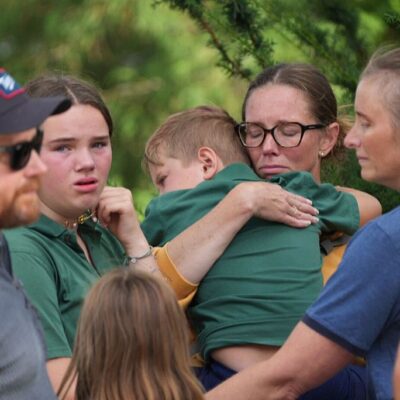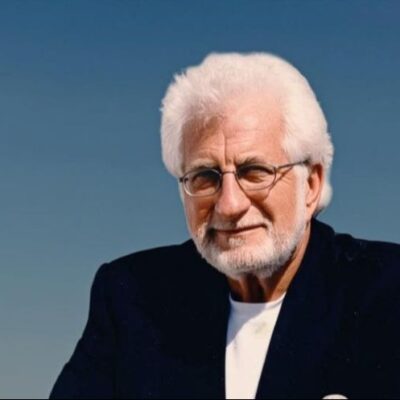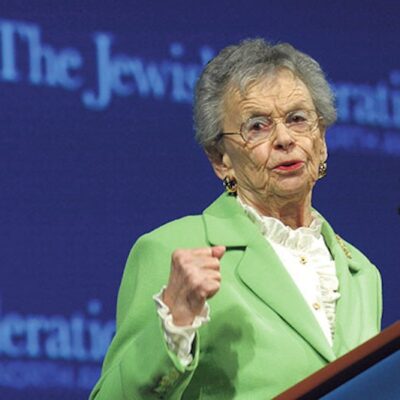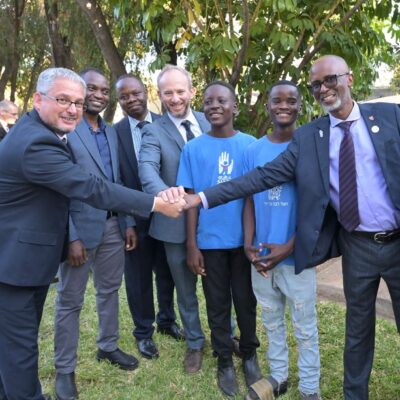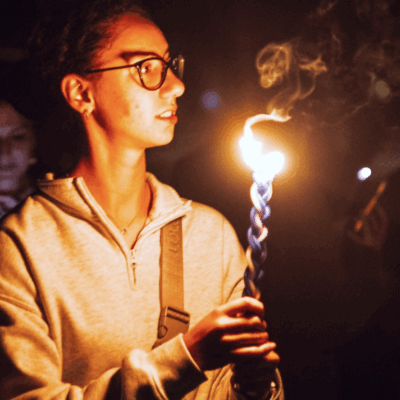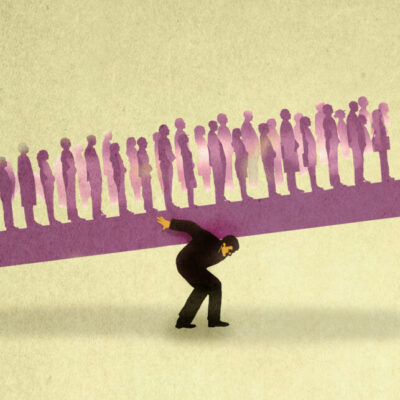INTO THE WILDERNESS
Teen mental health nonprofit BaMidbar to shut down Sept. 1 due to financial struggles
CEO says group decided to end operations instead of scaling back, believing other organizations could take on the mission

Courtesy/BaMidbar
Participants take part in a program run by BaMidbar, which was named to Slingshot Fund's 2023 '10 to Watch' list.
After expanding to meet the growing mental health needs of teenagers in the wake of the COVID-19 pandemic and the Oct. 7 terror attacks, the nonprofit BaMidbar will end operations on Sept. 1, the organization’s CEO, Whitney Fisch, announced on Wednesday in an email to supporters.
Fisch, who joined the organization last December, told eJewishPhilanthropy that BaMidbar did not have the funding necessary to continue in its current form. Instead of laying off workers and scaling back operations, she opted instead to shut down, noting that the decision was based, in part, on a recent eJP opinion piece.
“You guys posted this great op-ed a couple of weeks or months ago. I can’t remember which very thoughtful colleague wrote it, but it was a woman and she was talking about how we have so many small, niche Jewish nonprofits, and… are we being responsible with donor dollars, with all of these smaller nonprofits instead of joining together as established communities or institutions and using donor dollars to affect the biggest, most impactful change. When we were in a financial situation where we might not be able to move forward, that op-ed kept ringing in my head,” Fisch said, apparently referring to a piece by Maayan Aviv.
“And the [BaMidbar] board came together and made the decision — and I honestly think it was the right decision — to give me permission to find an acquirer of our mission, of our eight, nine years of really incredible, groundbreaking evidence-based programming, education workshops, and give it to an organization that can have even more of a footprint and impact on the national Jewish landscape for Jewish teens and young adults. And that’s what we’re here to do,” she said.
According to Fisch, BaMidbar has found a national organization that will adopt its mission and intellectual property going forward. However, since the agreement has not yet been fully signed by both sides, she said she was not able to identify the organization.
“The choice to send out the communication now [about BaMidbar’s closure], without being able to name the organization, was entirely a matter of timing. Sept. 1 is the start of the new fiscal year for us, so Aug. 31 is the last day of this fiscal year, and so that’s when we’re sunsetting,” she said. In her email to supporters, Fisch noted that any donations made after Sept. 1 will be automatically returned.
Fisch will stay on through November to oversee the transition as will the organization’s COO, Rachel Eisen, while the rest of BaMidbar’s staff have been let go.
Founded in 2016 as an “outgrowth” of Camp Ramah Rockies, BaMidbar originally focused on therapeutic wilderness expeditions. In a landscape dominated by Christian residential treatment facilities, Jewish teens seeking support for social, emotional and addiction-related struggles were left in the lurch, Fisch said.
“There was just nothing out there for residential treatment in the Jewish space,” she said. “If I wanted to be kosher. If I wanted therapy to be driven by Jewish values, that didn’t exist.”
During the pandemic, a “perfect storm” of COVID-19 regulations shutting down treatment facilities and growing criticism of residential treatment centers led the organization to expand. “There was a need to pivot, and at that point, no one was focusing on the Jewish community landscape,” said Fisch. “No one was focusing exclusively on the mental health and wellness of Jewish teens and young adults.”
Becoming an independent 501(c)3 in 2018, the group started offering additional services, including professional development programs, mental health and addiction awareness workshops, a fellowship, and opened a Boston office that offers virtual and in-person therapy. Earlier this year, the organization launched a teen advisory committee.
After Oct. 7, 2023, in light of the attacks and war in Israel and rising antisemitism around the world, addressing the mental health needs in the Jewish community became critical, Fisch said, as many teens felt increasingly alienated from their peers.
While she said that the Oct. 7 attacks and ensuing rise in antisemitism have increased the need for organizations like BaMidbar, donors have been focused on other areas. “The philanthropic landscape shifted, obviously, post-Oct. 7. Where mental health was high on the philanthropic passions of donors and foundations post-COVID, [after the Oct. 7 attacks] — very understandably and very clearly — those funds started going to Israel. Those funds started going to combating antisemitism… and that certainly impacted our revenue stream,” she said.
Fisch chided those focused solely on combating antisemitism on college campuses without considering the mental health toll that antisemitism is taking on Jewish students. “These are 19- and 20-year-olds who we’re trying to teach how to become First Amendment rights lawyers and freedom of speech experts and advocates on antisemitism. And we weren’t talking about, ‘How do we take care of them?’ and ‘Do we give them permission to just be kids sometimes?’” she said. “Mental health and wellness should not be a check mark for an organization… It needs to be robust. It needs to be innovative. And we’re not quite there yet on the national landscape.”
In part, Fisch described BaMidbar as being a victim of its own success by making teen mental health a widely recognized issue, noting that many national and international organizations, such as Jewish Federations of North America, BBYO, Hillel International and others have created or expanded their psychological services in recent years.
“In some ways, the spark that we created in terms of bringing this topic to the forefront of the landscape, ended up putting us [in a position with funders of] ‘Why do I need to pay to have someone come in and train my staff, when internally, I can do that myself?’” she said.
BaMidbar’s clients were all informed of the closure in advance so that they could find new therapists and mental health frameworks, Fisch said.
“I really believe in my kishkas that we are living our mission, and I believe it is the right thing to do. It doesn’t make it easier. It doesn’t take away the sadness,” she said. “But I also really, really genuinely, in my heart, celebrate the incredible work that was done way before I stepped foot into the office of CEO of BaMidbar… I hope that those who worked their tushies off to grow BaMidbar and get it off the ground as the first ever Jewish wilderness residential facility, feel proud and know that their work was and is honored.”

